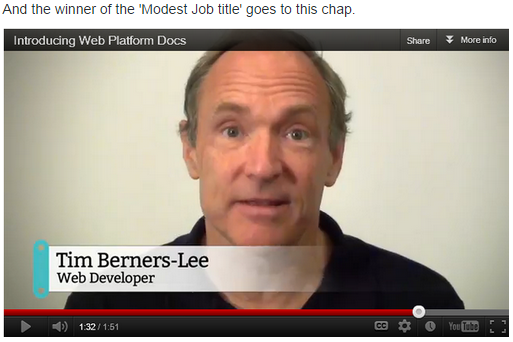This screenshot and associated comment are linguistically interesting for (at least) two reasons:
The first reason is the meaning of the phrase 'web developer'. This is Tim Berners-Lee, the man who invented the World Wide Web (which is different from the internet in slightly complicated ways). Therefore, he is a web developer in the everyday sense of the term, in which he writes code or whatever it is that web developers do, but he is also the person who developed the web - literally, the web developer.
This is an insight into the way that the meaning of compounds in English (and other languages) can be arbitrary, in that a blackboard is a board that is black while a washboard is not a board that is wash, but also follow common patterns. So we can't know out of context that 'web developer' is a developer for the web, we just have to know that that's what it conventionally means. But we can make predictions based on common ways of combining words to make compounds. You wouldn't expect a hand mixer to be a thing that mixes hands, for instance - you'd expect it to be a mixer that is operated by hand, as that's more sensible. But grammatically, both are possible. The former is what's known as a synthetic compound, in which the first part (in English) is the object of the verb in the second part. So a hand mixer mixes hands, a lorry driver drives lorries, and a web developer develops the web. The latter doesn't have this relationship between the parts. Instead, the first part modifies the thing in the second part. A hand mixer is a mixer that is hand-powered, a safe driver is a driver who is safe, and a web developer is a developer who works on the web.
Secondly, this is a good example of the way a word can switch to meaning the exact opposite of what it used to mean. I'm talking about 'modest' in the comment above the photo. Modest is my contender for 'Word Most Likely To Mean Its Opposite In Fifty Years'. It's mostly used nowadays (in my unscientific opinion) in fossilised phrases like 'modest income' or in a sarcastic sense ('Oh, modest as well!' when someone boasts). That to me is prime material for reanalysis as its own antonym. For that to happen, there has to be some confusion or obfuscation of the meaning. In that comment, it's not clear if the commenter is being sarcastic (ie using the 'invented the web' reading of the job title) or genuine (using the 'programmer' meaning). Someone for whom the word means 'proud' or 'boastful' could interpret it their way, and one more instance of modest means the opposite of what it does to someone else. If they then use it in an unambiguous way to mean 'proud', well, that meaning scores one more point and semantic shift marches on.

This comment has been removed by a blog administrator.
ReplyDeleteThis comment has been removed by a blog administrator.
ReplyDelete